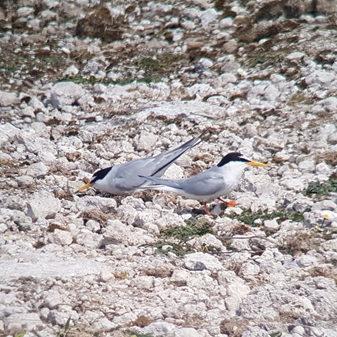Looking North over the reserve towards Millom and Black Combe, with the new island visible to the left of the image (Rachelle Regan)
Hello! I am the second Field Officer here over the breeding season, who shares responsibility for surveying adult numbers and productivity of our key species (notably sandwich, common, and little terns). We also monitor predation events and engage with members of the public about the RSPB’s work at the reserve, its history, and the wildlife found here.
Work was finished on the new island in January this year, complemented by an extension to the eastern side of the main island. The new island has seen modest but encouraging interest from breeding birds, and is currently home to a ringed plover pair (with two chicks) and a single oystercatcher nest as well as 2 common tern nests. We are hopeful of increased use of the island in future years once the substrate matures. At least 20 common tern pairs have used the new extension to the main island, making use of the increased space provided where a small island has been joined to the ‘mainland’, forming a miniature peninsula.

Little tern (Sternula albifrons) pair (Rachelle Regan)
Current trends point to a successful season all round. The peak count of little tern adults so far this season is 87, with at least 40 pairs, more than triple the number of pairs last year! Twenty six little tern chicks were spotted during a ringing session on the 11th June, the highest count since at least 2017, so we are hopeful of an excellent year for the species here. They appear to be responding particularly well to the application of slag to the concrete surface at their favoured spot, which helps to prevent the accumulation of rainwater around the nests.
Fifty common tern pairs (with a minimum of 40 chicks so far) points to a good year for this species too. Alongside this, at least 500 black headed gull chicks and 200 sandwich tern chicks means the colony is a busy place.